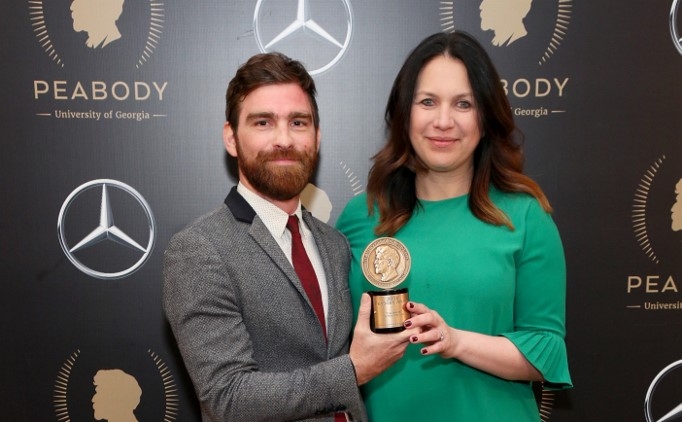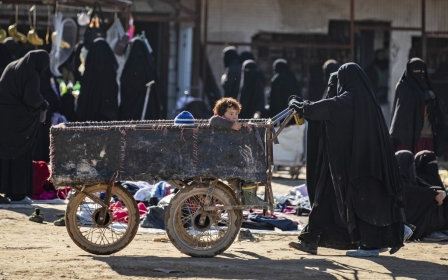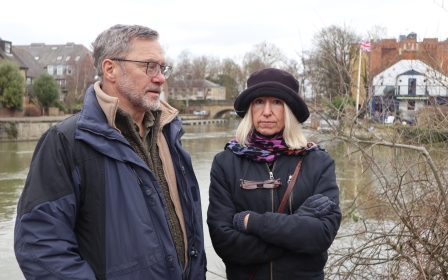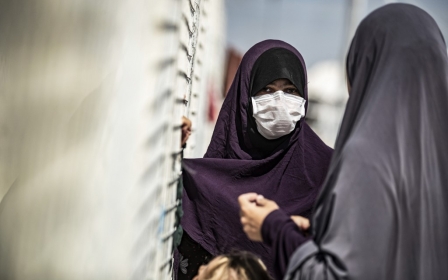New York Times says Caliphate podcast probably made up by 'con artist'

The New York Times admitted on Friday that its award-winning Caliphate podcast, based in large part on the apparent confessions of a self-styled Islamic State (IS) group executioner, did not meet its standards for accuracy and was likely made up by a “con artist”.
The US newspaper launched a review of the 2018 series in September after Shehroze Chaudhry, a Canadian man prominently featured in several episodes in which he describes himself shooting hostages and witnessing other atrocities in Syria in 2014, was arrested in Toronto and charged with perpetrating a terrorist hoax.
The review concluded that the series, presented by foreign correspondent Rukmini Callimachi, had given “too much credence to [Chaudhry's] false or exaggerated accounts”.
It said that fact-checking details about Chaudhry's account of the time he claimed to have spent in Syria was “not sufficiently rigorous” and journalists had been “too credulous” in their reporting.
The New York Times determined that “Caliphate,” its award-winning 2018 podcast, fell short of standards. The Times cited an institutional failure and said the "Caliphate" team gave too much credence to the false or exaggerated claims of one main subject. https://t.co/UoznJ8AWat
— The New York Times (@nytimes) December 18, 2020
New MEE newsletter: Jerusalem Dispatch
Sign up to get the latest insights and analysis on Israel-Palestine, alongside Turkey Unpacked and other MEE newsletters
“I think this guy, we now believe, was a con artist, who made up most if not all that he told us,” Dean Baquet, the New York Times' executive editor said in an audio interview with his own newspaper, which was added to the Caliphate series page on Friday.
“When The New York Times does deep, big, ambitious journalism in any format, we put it to a tremendous amount of scrutiny at the upper levels of the newsroom,” said Baquet.
“We did not do that in this case. And I think that I or somebody else should have provided that same kind of scrutiny, because it was a big, ambitious piece of journalism. And I did not provide that kind of scrutiny, nor did my top deputies with deep experience in examining investigative reporting.”
Baquet said Callimachi, who has covered stories about IS and al-Qaeda since joining the New York Times in 2014, would stay at the paper.
“She’s going to take on a new beat, and she and I are discussing possibilities,” he said. “I think it’s hard to continue covering terrorism after what happened with this story. But I think she’s a fine reporter.”
Feted series
On Friday, Callimachi apologised to listeners for missing that Chaudhry was "lying about key aspects of his account", but she maintained that she is still proud of her work covering IS.
"Reflecting on what I missed in reporting our podcast is humbling. Thinking of the colleagues and the newsroom I let down is gutting... To our listeners, I apologize for what we missed and what we got wrong. We are correcting the record and I commit to doing better in the future," she said in a statement.
Caliphate was widely feted at the time of its release, winning a Peabody radio/podcast award and a Pulitzer Prize nomination for Callimachi.
But family support groups and campaigners for the repatriation of Canadians being held in camps and prisons in northeastern Syria alongside other foreign nationals suspected of links to IS believe the series may have contributed to the Canadian government's refusal to repatriate its citizens.
Alexandra Bain, director of Families Against Violent Extremism (FAVE), told Middle East Eye that several planned repatriations had been cancelled at the last minute by the Canadian government after opposition politicians had asked in parliament how Chaudhry, who is known in the series as Abu Huzayfah, had been able to return to Canada without being detained.
Sally Lane, the mother of British-Canadian detainee Jack Letts, told MEE that the Canadian government had initially been working with families on repatriations.
But there had been a “complete sea change” after the debate in parliament prompted by the broadcast of Caliphate, she said.
“Canada had been our great hope. The Canadians had been proactive and were discussing exit routes with the Kurds via Turkey. But they went from being positive to saying there is nothing we can do.”
In a Twitter conversation with Lane, in December 2019, Callimachi appeared to acknowledge that Canada's shift in policy had in part been influenced by reaction to the podcast, writing: “Canada was moving to bring back detainees until my podcast appeared”.
Yes, it’s the Catch-22 that liberal democracies like Canada, which don’t have strict material support statutes, find themselves in. I agree it’s not justice to leave them there. It’s equally unfair to the public to bring them back if they can’t be prosecuted.
— Rukmini Callimachi (@rcallimachi) December 2, 2019
As @AmarAmarasingam noted, Canada was moving to bring back detainees until my podcast appeared. Fact that they couldn’t prosecute him sent shockwaves through system, pointing to fact that it’s close to impossible to collect forensic evidence from black hole that was the caliphate
— Rukmini Callimachi (@rcallimachi) December 2, 2019
In an interview with Canada's CBC network following the release of Caliphate, Chaudhry denied having killed anyone but maintained that he had travelled to Syria.
“You can put me through a polygraph and it will prove that I didn't kill anyone," he said.
"I was being childish. I was describing what I saw and basically, I was close enough to think it was me."
A lawyer for Chaudhry told the New York Times that his client would plead not guilty to the hoax charge.
Middle East Eye delivers independent and unrivalled coverage and analysis of the Middle East, North Africa and beyond. To learn more about republishing this content and the associated fees, please fill out this form. More about MEE can be found here.




